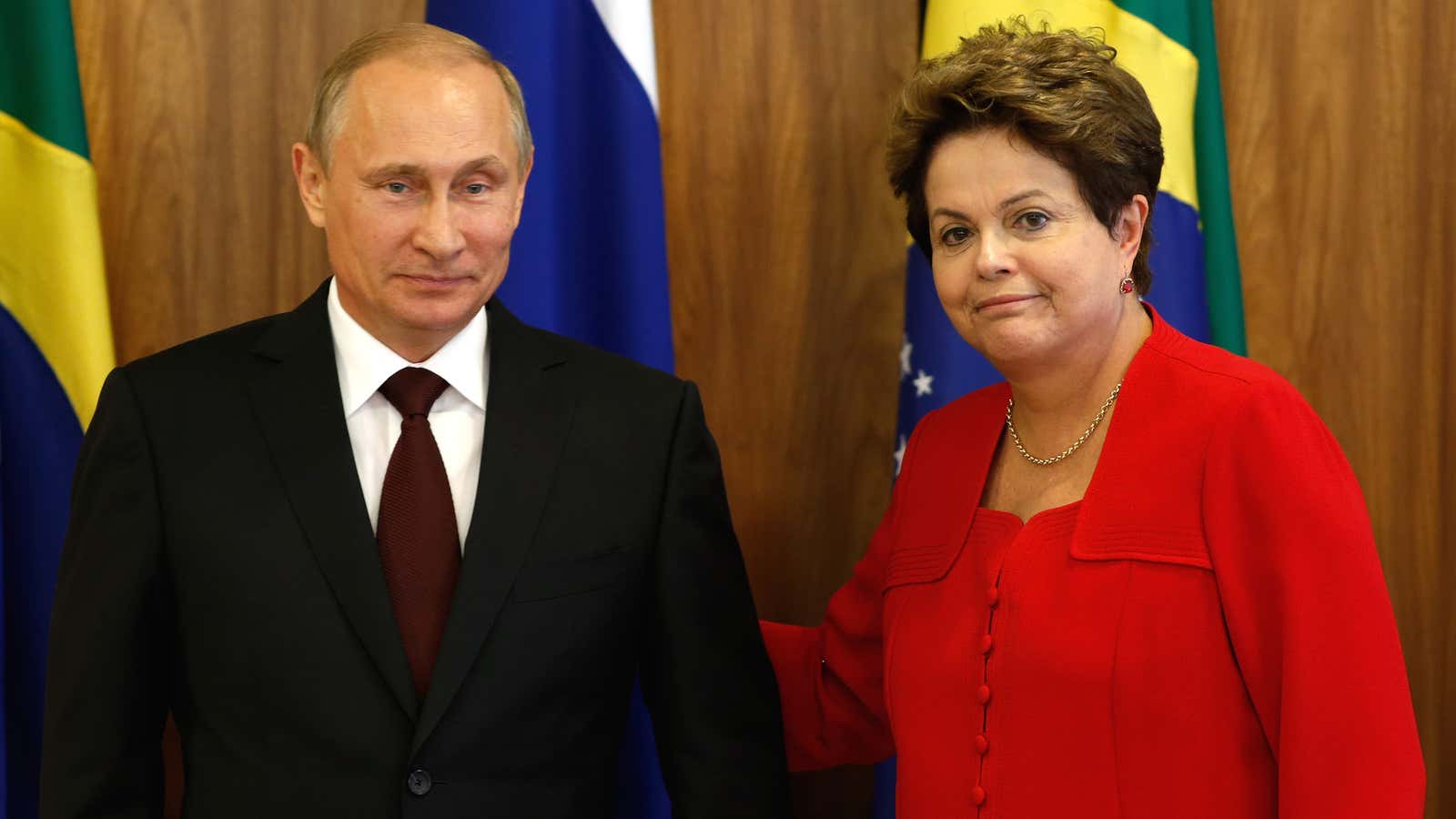The strongman’s club—made up of the three strong-willed leaders who together rule over much of the world’s population and land mass—is having its first meeting in Fortaleza, Brazil.
Russian president Vladimir Putin has been in Brazil since the weekend, and even watched the World Cup final. Chinese president Xi Jinping flew in on Monday. And after a brief stopover in Berlin, Indian prime minister Narendra Modi recently arrived for his first big multilateral meeting since taking office.
It’s hard to pinpoint a single economic policy that unites these men, but it’s clear they’re part of a new world order—one of nationalistic leaders who rule with an iron fist. As the trio attends the sixth BRICS summit in Brazil, each is in a unique position of authority and power, both domestically and globally. Here’s a closer look:
Putin: Beloved at home, but not abroad
After the Crimea invasion and the still-simmering Ukrainian crisis, Putin’s ratings in Russia have soared, with more than 80% of his countrymen supporting the former KGB agent’s leadership. Abroad, it is a different story. Public opinion in Europe and North America has hardened against him, according to a new Pew Research Center study.
But in parts of Asia—Pakistan, India, Philippines and most significantly, in China—his popularity has jumped. Putin signed a $400 billion gas deal with China in May, after talks that reportedly went up to 4 a.m. during the Russian president’s visit to Shanghai.
Xi: Getting aggressive with the neighbors
The Chinese president hasn’t invaded a rebellious neighbor yet, but Xi has made enough aggressive noises in recent months. From pushing into the disputed South China Sea to announcing a no-fly zone over the East China Sea, Beijing’s newly sharpened belligerence is reportedly directed by the president himself. That, alongside other traits, has even prompted direct comparisons been the Chinese and the Russian presidents; one Chinese scholar explained “Why Xi Jinping Is China’s Putin” in an essay this month.
At home, he has used a wide-ranging anti-corruption campaign to displace opponents and consolidate his own power base within China’s sprawling Communist party machinery. In Brazil, he has already moved quickly to cement ties with India after a pre-summit meeting with Modi, saying (link in Chinese): “If India and China speak with one voice, the world will listen.”
Modi: The honeymoon is ending
Fresh from a landslide electoral victory that appears to have silenced questions about his role in the Gujurat riots of 2002, the Indian prime minister is in what may be the last days of his extended honeymoon period. Despite questions over his uncharacteristic silence and a budget that mostly failed to excite, Modi’s standing domestically remains strong.
Even as Modi was ostracized after the Gujarat riots by some nations—including the United States, which denied him a visa—he cemented ties with China as Gujarat’s chief minister, so his relationship there is already strong. Within south Asia, Modi pulled off a diplomatic coup at his inauguration, because nearly every head of state from the region was present.
The BRICS summit, though, will be different challenge for Modi, as he prepares for the UN general assembly and a bilateral meeting with US president Obama in September. A shortage of interpreters could be a problem, since the prime minister prefers to conduct diplomacy in Hindi.
Don’t forget about the B & S in BRICS
The two-day meeting will also include Brazil’s president Dilma Rousseff, of course, and South Africa’s Jacob Zuma. But domestic events have undermined their strength: Brazil’s elections are due in October, and there are doubts about whether Rousseff will be able to survive, particularly after a humiliating defeat in the World Cup. And in South Africa, Zuma is fighting concerns over his health and, more importantly, corruption.
The three strongmen, in the meanwhile, look poised for a party of their own.
